中考英语容易混淆的单词和词组解析
中考英语常用易混淆单词词组的区别用法详解
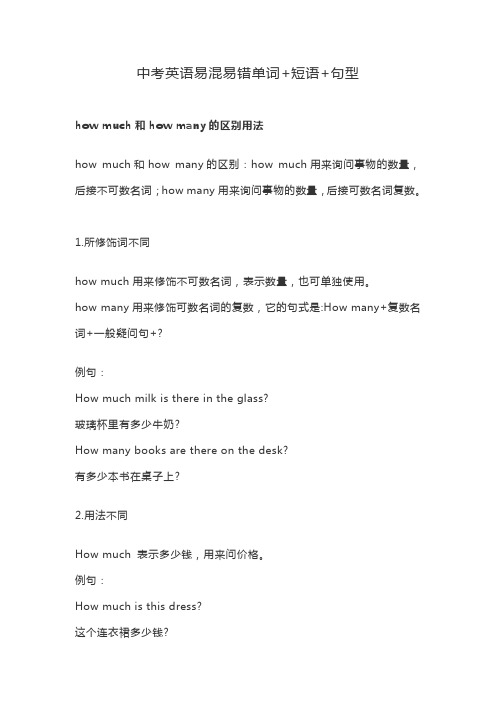
中考英语易混易错单词+短语+句型how much和how many的区别用法how much和how many的区别:how much用来询问事物的数量,后接不可数名词;how many用来询问事物的数量,后接可数名词复数。
1.所修饰词不同how much用来修饰不可数名词,表示数量,也可单独使用。
how many用来修饰可数名词的复数,它的句式是:How many+复数名词+一般疑问句+?例句:How much milk is there in the glass?玻璃杯里有多少牛奶?How many books are there on the desk?有多少本书在桌子上?2.用法不同How much 表示多少钱,用来问价格。
例句:How much is this dress?这个连衣裙多少钱?How many 表示多少,用来问数量。
例句:How many apples do you have?你有多少苹果?in和on的区别用法当我们表示某些东西被其他东西所包围时使用“in”这个词。
而“on”用于描述物体被放置在其他物体上方或外部的情况。
in可表时间,表地点,表手段、方法、材料。
on表示时间、地点、方位等。
1.意思不同in:prep.在... 里;在... 地方;在... 期间on:prep.在... 之上2.用法不同in:in着重一段时间的过程,常用于重复动作或延续动作。
in表示从现在时间算起推移到将来的一段时间之后,一般与将来时态连用。
例句:He is a layman in economics.他对经济学一窍不通。
on:表示“在物体的表面上”,只能用on的表达方式有on the next morning,on the following。
例句:The spider is walking on the ceiling.蜘蛛在天花板上爬行。
3.侧重点不同in:表示“在其中”。
on:表示“在表面”。
中考英语易混淆词汇辨析
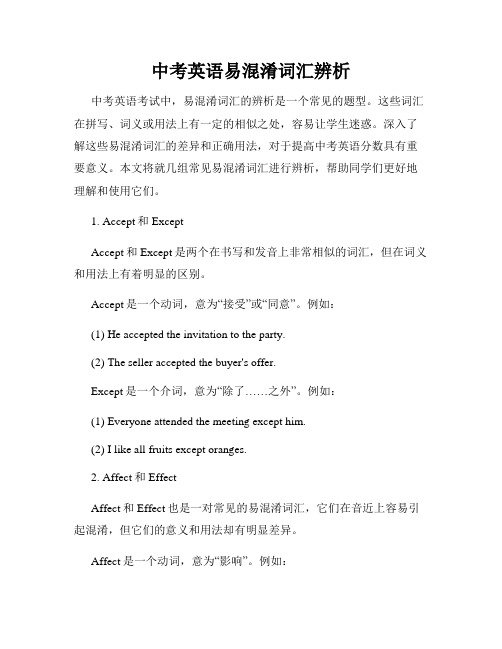
中考英语易混淆词汇辨析中考英语考试中,易混淆词汇的辨析是一个常见的题型。
这些词汇在拼写、词义或用法上有一定的相似之处,容易让学生迷惑。
深入了解这些易混淆词汇的差异和正确用法,对于提高中考英语分数具有重要意义。
本文将就几组常见易混淆词汇进行辨析,帮助同学们更好地理解和使用它们。
1. Accept和ExceptAccept和Except是两个在书写和发音上非常相似的词汇,但在词义和用法上有着明显的区别。
Accept是一个动词,意为“接受”或“同意”。
例如:(1) He accepted the invitation to the party.(2) The seller accepted the buyer's offer.Except是一个介词,意为“除了……之外”。
例如:(1) Everyone attended the meeting except him.(2) I like all fruits except oranges.2. Affect和EffectAffect和Effect也是一对常见的易混淆词汇,它们在音近上容易引起混淆,但它们的意义和用法却有明显差异。
Affect是一个动词,意为“影响”。
例如:(1) The heavy rain affected the traffic.(2) Lack of exercise can affect your health.Effect既可以是名词,意为“效果”或“影响”,也可以是动词,意为“产生影响”。
例如:(1) The medicine has a good effect on curing the disease.(2) His speech effectively influenced the audience.3. Advice和AdviseAdvice是一个名词,意为“建议”或“忠告”。
例如:(1) I need some advice on how to solve this problem.(2) His advice helped me make a decision.Advise是一个动词,意为“建议”。
初中英语最容易混淆的单词、词组归纳总结,都是干货记得收藏
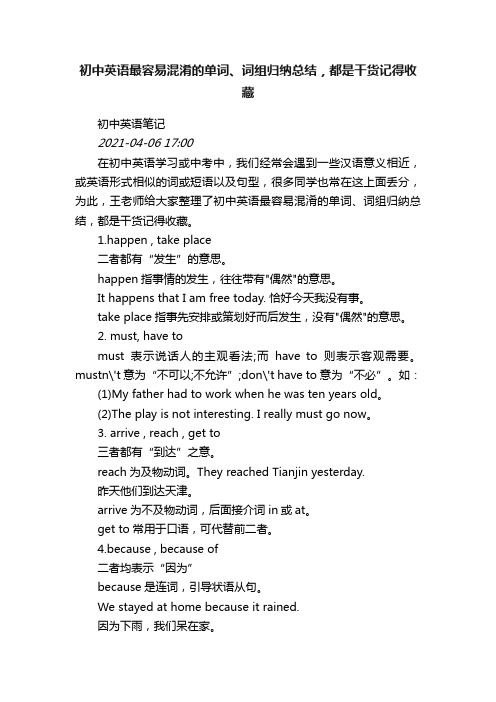
初中英语最容易混淆的单词、词组归纳总结,都是干货记得收藏初中英语笔记2021-04-06 17:00在初中英语学习或中考中,我们经常会遇到一些汉语意义相近,或英语形式相似的词或短语以及句型,很多同学也常在这上面丢分,为此,王老师给大家整理了初中英语最容易混淆的单词、词组归纳总结,都是干货记得收藏。
1.happen , take place二者都有“发生”的意思。
happen指事情的发生,往往带有"偶然"的意思。
It happens that I am free today. 恰好今天我没有事。
take place指事先安排或策划好而后发生,没有"偶然"的意思。
2. must, have tomust表示说话人的主观看法;而have to则表示客观需要。
mustn\'t意为“不可以;不允许”;don\'t have to意为“不必”。
如:(1)My father had to work when he was ten years old。
(2)The play is not interesting. I really must go now。
3. arrive , reach , get to三者都有“到达”之意。
reach为及物动词。
They reached Tianjin yesterday.昨天他们到达天津。
arrive为不及物动词,后面接介词in或at。
get to常用于口语,可代替前二者。
4.because , because of二者均表示“因为”because是连词,引导状语从句。
We stayed at home because it rained.因为下雨,我们呆在家。
because of是短语介词,后面接名词性词语。
We stayed at home because of the rain .因为下雨,我们呆在家。
5. in front of, in the front ofin front of…意思是"在……前面",指甲物在乙物之前,两者互不包括;其反义词是behind(在……的后面)。
202X年中考英语78个易混易错单词+短语+句型
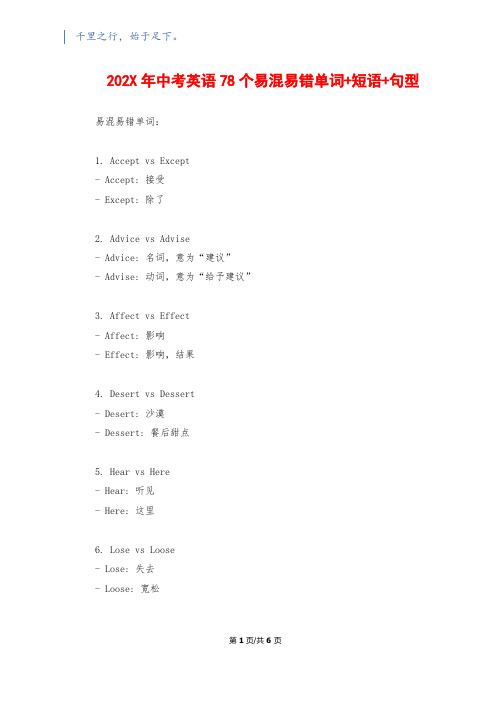
202X年中考英语78个易混易错单词+短语+句型易混易错单词:1. Accept vs Except- Accept: 接受- Except: 除了2. Advice vs Advise- Advice: 名词,意为“建议”- Advise: 动词,意为“给予建议”3. Affect vs Effect- Affect: 影响- Effect: 影响,结果4. Desert vs Dessert- Desert: 沙漠- Dessert: 餐后甜点5. Hear vs Here- Hear: 听见- Here: 这里6. Lose vs Loose- Lose: 失去- Loose: 宽松第1页/共6页7. Weather vs Whether- Weather: 天气- Whether: 是否8. Quiet vs Quite- Quiet: 安静- Quite: 相当9. Principal vs Principle- Principal: 校长- Principle: 原则10. Stationary vs Stationery - Stationary: 静止的- Stationery: 文具11. Than vs Then- Than: 比如- Then: 然后12. Their vs There vs They're - Their: 他们的- There: 那里- They're: they are(他们是)13. Threw vs Through- Threw: 扔- Through: 穿过14. To vs Too- Too: 也,过于15. Its vs It's- Its: 它的- It's: it is(它是)16. Your vs You're- Your: 你的- You're: you are(你是)17. Principal vs Principle- Principal: 校长- Principle: 原则18. Heel vs Heal- Heel: 脚后跟- Heal: 治愈19. Cement vs Concrete- Cement: 水泥- Concrete: 混凝土20. Idle vs Idol- Idle: 闲置的- Idol: 偶像21. Cell vs Sell- Cell: 细胞第3页/共6页22. Fare vs Fair- Fare: 费用- Fair: 公平的23. Foul vs Fowl- Foul: 犯规的- Fowl: 家禽24. Peak vs Peek vs Pique- Peak: 顶峰- Peek: 偷看- Pique: 激怒25. Breath vs Breathe- Breath: 呼吸(名词)- Breathe: 呼吸(动词)易混易错短语:1. By the way vs Anyway- By the way: 顺便问一下- Anyway: 无论如何2. In the meantime vs Meanwhile- In the meantime: 与此同时- Meanwhile: 与此同时3. On the other hand vs On the one hand- On the other hand: 另一方面- On the one hand: 一方面4. It's all Greek to me- 意为“对我来说这都是希腊文”,表示完全听不懂5. Fit as a fiddle- 意为“身体非常健康”6. Break a leg- 意为“祝你好运”7. A piece of cake- 意为“易如反掌”8. Once in a blue moon- 意为“千载难逢”9. Bite the bullet- 意为“咬紧牙关”10. Keep your fingers crossed- 意为“祝你好运”易混易错句型:1. I have been to New York last year.- I went to New York last year.第5页/共6页2. She didn't went to school yesterday.- She didn't go to school yesterday.3. Have you ever been to Paris?- Have you ever been to Paris before?4. I don't know nothing about that.- I don't know anything about that.5. He was tired, so he gone to bed early. - He was tired, so he went to bed early.6. I have lived in this city since 5 years. - I have lived in this city for 5 years.7. I am here for visit my grandparents.- I am here to visit my grandparents.8. We don't have no time for that.- We don't have any time for that.。
中考常见易混淆英语单词

中考常见易混淆英语单词1.worth, worthy 与worthwhileworth价值,可贵之处,作形容词时与worthy和worthwhile都是“值得……”的意思,但用法不同,如:This book is worth reading./This book is worth 3 yuan?./It s wort hwhile to visit (visiting) thisplace./This place is worthy of a visit (visiting ).worth只作表语,它后面一般接动名词,也可接名词,但只限于钱数,不接不定式。
如果用不定式或动名词作主语,则要用It s worthwhile…结构,把不定式、动名词放在句末;worthy是形容词,worthy可作表语,也可作定语,作表语时,后跟of接名词或动名词,也可以接不定式。
worthwhile和worth虽均有“值得的”意思,worth只作表语,用于be worth sth.短语中,如:It s worth the trouble.麻烦一点值得。
This watch is worth this much money.这块手表值这么多钱;而worthwhile意为“值得一做的(worth doing)”,既可作表语,如:T hese results were not worthwhile.也可用作定语。
2.rise 与 raise这两个词虽不同义,但因意义上有联系而易被混淆。
rise 上升,上涨,起床,站立。
含义较广,总的意思是指依次上升,如自然界的日、月、星、雾、云的上升,人体从睡、跪、坐、躺等姿势站立起来等。
该词为不及物动词,其过去式与过去分词分别是rose 和 risen。
例如:The sun rises in the east and sets in the west.日出于东而落于西。
/ Prices rise every day in those countries.那些国家里的物价天天上涨。
中考英语易混词汇辨析
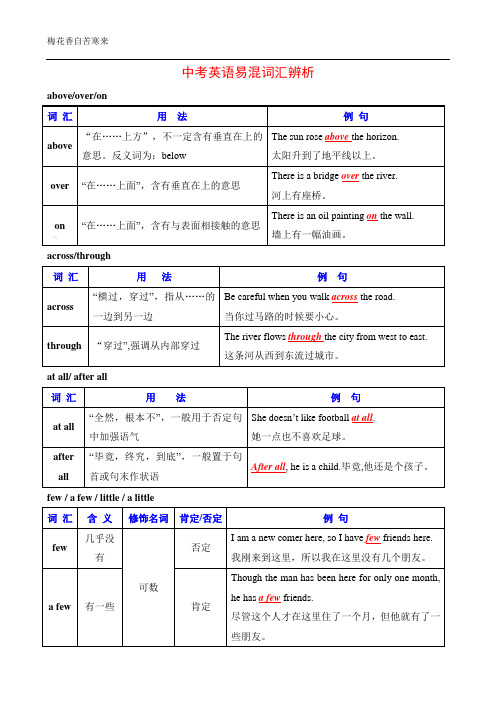
中考英语易混词汇辨析above/over/on词汇用法例句above “在……上方”,不一定含有垂直在上的意思。
反义词为:belowThe sun rose above the horizon.太阳升到了地平线以上。
over “在……上面”,含有垂直在上的意思There is a bridge over the river. 河上有座桥。
on“在……上面”,含有与表面相接触的意思There is an oil painting on the wall. 墙上有一幅油画。
across/through词汇用法例句across “横过,穿过”,指从……的一边到另一边Be careful when you walk across the road.当你过马路的时候要小心。
through“穿过”,强调从内部穿过The river flows through the city from west to east. 这条河从西到东流过城市。
at all/ after all词汇用法例句at all “全然,根本不”,一般用于否定句中加强语气She doesn’t like football at all.她一点也不喜欢足球。
after all “毕竟,终究,到底”,一般置于句首或句末作状语After all, he is a child.毕竟,他还是个孩子。
few / a few / little / a little词汇含义修饰名词肯定/否定例句few 几乎没有可数否定I am a new comer here, so I have few friends here.我刚来到这里,所以我在这里没有几个朋友。
a few 有一些肯定Though the man has been here for only one month, he has a few friends.尽管这个人才在这里住了一个月,但他就有了一些朋友。
中考英语之易混淆词汇知识点辨析
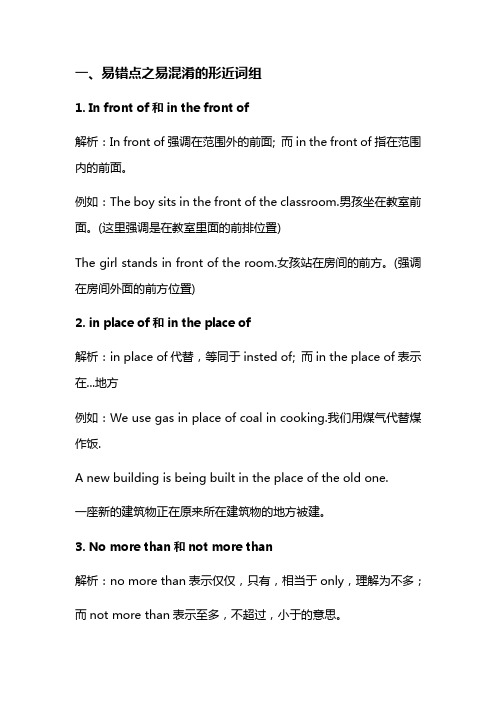
一、易错点之易混淆的形近词组1.In front of和in the front of解析:In front of强调在范围外的前面; 而in the front of指在范围内的前面。
例如:The boy sits in the front of the classroom.男孩坐在教室前面。
(这里强调是在教室里面的前排位置)The girl stands in front of the room.女孩站在房间的前方。
(强调在房间外面的前方位置)2.in place of和in the place of解析:in place of代替,等同于insted of; 而in the place of表示在...地方例如:We use gas in place of coal in cooking.我们用煤气代替煤作饭.A new building is being built in the place of the old one.一座新的建筑物正在原来所在建筑物的地方被建。
3.No more than和not more than解析:no more than表示仅仅,只有,相当于only,理解为不多;而not more than表示至多,不超过,小于的意思。
例如:He is no more than an ordinary English teacher. 他只不过是个普通的英文老师。
He has not more than three children. 他最多3 个孩子(有或许还不到三个)4.On earth和on the earth解析:两者都有在地上,在地球上的意思,但on earth还有到底,究竟的意思;On the earth只是单纯的表示在地上,在地球上例如:where on earth did you spring from?你究竟从哪里冒出来的?What if there was no lead on the earth at all?如果地球上根本就没有铅这种物质怎么办?5.At all和after all解析:at all表示根本,全然的意思,常用短语not at all表示一点也不;after all表示到底,毕竟的意思例如:I don't know him at all. 我根本不认识他。
初三英语词汇辨析常见错误

初三英语词汇辨析常见错误在初三英语的学习中,词汇辨析是一个重要的部分,但同学们在这方面常常会出现一些错误。
以下是一些常见的错误类型及分析。
一、混淆近义词很多同学容易将意思相近的单词用错,比如“alone”和“lonely”。
“alone”侧重于“独自一人”,表示客观上的状态;而“lonely”则侧重于“孤独的、寂寞的”,更多地表达一种主观感受。
例如:He was alone in the room(他独自一人在房间里。
)He feels lonely because he has no friends (他感到孤独,因为他没有朋友。
)再比如“take”“bring”和“fetch”。
“take”表示“带走、拿走”,是把某物从说话者所在的地方带到别的地方;“bring”表示“带来、拿来”,是把某物从别的地方带到说话者所在的地方;“fetch”则表示“去取来、去拿来”,强调一个往返的动作。
例如:Take this book to the library(把这本书带到图书馆去。
)Bring me a cup of coffee(给我拿一杯咖啡来。
)Please fetch my bag from the classroom(请从教室把我的包拿来。
)二、忽略词汇的词性有些单词虽然拼写相同,但词性不同,意思和用法也不同。
比如“interest”这个词,既可以作名词,表示“兴趣”,也可以作动词,表示“使感兴趣”。
例如:My interest is reading(名词,我的兴趣是阅读。
)This book interests me(动词,这本书使我感兴趣。
)再如“success”是名词,“succeed”是动词,“successful”是形容词。
我们要说“He succeeded in the exam”(他考试成功了。
)而不能说“He successed in the exam”三、误解短语动词的含义短语动词也是同学们容易出错的地方。
- 1、下载文档前请自行甄别文档内容的完整性,平台不提供额外的编辑、内容补充、找答案等附加服务。
- 2、"仅部分预览"的文档,不可在线预览部分如存在完整性等问题,可反馈申请退款(可完整预览的文档不适用该条件!)。
- 3、如文档侵犯您的权益,请联系客服反馈,我们会尽快为您处理(人工客服工作时间:9:00-18:30)。
在初中英语学习或中考中经常会遇到一些汉语意义相近,或英语形式相似的词或短语以及句型。
只有真正了解意思才能做到准确无误。
希望以下的练习有助于你的归纳。
Fill in the blanks with the given words in their proper forms.1. affect/effect1)Nothing can __________ our friendship even if we live in different places.2)Alcohol has a very bad __________ on drivers.2. a great deal of/a great deal1) There is__________information in the internet.2) Don't eat __________ before swimming.3.a lot of/ a lot1) There are __________ visitors in Nanjin Road Walkway each weekend.2) During holiday some students sleep __________ in the day.4. much/little/a little/huge amounts of/a huge amount of/many/few/a few修饰可数名词 a number of/many/a few/few修饰可数或不可数名词 a lot of= lots of= plenty of修饰不可数名词 a great deal of/a huge amount of= huge amounts of/much/a little/little1) There isn't __________ ink in the bottle.2) Are there __________ boys playing basketball in the street?4) Don't worry, it's only nine o'clock. We still have __________ time.5) It's snowing heavily. There are _________cyclists in the streets.6) He is very careless. He always makes _________ mistakes in his test paper.7) The little girl got _________ money from her parents when she was only ten.5. a number of/the number of1) _________ the students in this school is one thousand two hundred and eleven.2) _________ people have applied for this job.6. aboard/abroad1) Do you want to go__________ to further your study when you grow up?2) Look, Stone is already __________the ship.7. agree with/agree to1) Do you ________ me about the plan?2) We all _________ the arrangement.8. alive/living1) The dying man over there is still __________.2) All _______ things can't live without air or water.9. all of/none of/both of/neither of/either of/some of/many of/few of/much of1) _________ us have to go to school at the age of eight.2) __________ the two answers is correct.3) In China _________ the pilots was woman many years ago.4) I don't want _________ the two scarves. Please show me another.5) ________ my parents got retired and lived with my younger brother in Japan.6) ________ the students like to see that film.7) ________the boys like playing basketball.10. alone/lonelyMy grandpa lives___________ , but he has a lot of friends, so he never feels11. answer/reply1) Can you __________ this question right now?2) What did he do in ____________ to your challenge?12. at table/at the table1) The man sitting _________ is the new manager of this restaurant.2) Children must learn to behave _________.13. be familiar to/be familiar with1) I am not very __________ pop singers.2) Our national anthem ___________ each of the students, even the kids in nurseries.14. full/fill1) Will you please __________ in this form with a pen?2) She was ___________of news. That means she couldn't stop herself talking about it.15. be located/stand/lie1) Shanghai __________ in the east of China.2) That quiet small town is __________ at the foot of the mountain.3) A clock __________ on the sideboard was an antique.16. be made of/be made from/be made in1) This watch _________ Japan in 2002.2) Bread _________ wheat.3) The blackboard _________ glass and wood.17. beat/win1) Mum always _________ me when we played chess before I was eight years old.2) To my surprise, two of the students in our school _________ the first prize in the English contest this year.3) He _________ me at table tennis yesterday.18. beside/besides/except/except for2) The girl sitting _________ Ms. Green is from Singapore.3) We have seven lessons every day_________ Saturday and Sunday.4) All the students attended the lecture _________ the teachers.19. borrow/lend/keep1) Could you tell me how long I can _________ the VCD?2) I have no MP3, may I _________ yours?3) You'd better not _________ my laptop to others.20. bring/take/fetch/carry1) Would you please _________ your umbrella in the next room. It's raining outside. 2) Remember to _________ your homework tomorrow.3 ) It's getting windy, you'd better _________ a coat with you while you are out.4) Light trains always _________ plenty of people to and from work in rush hours.21. cabbage/fish1) I bought lots of ___________ yesterday.2) ___________ was served after the first course.3) They caught several frogs, crabs and ___________ in the river yesterday.4) I think you'd better eat some more ___________ vegetables are good for you.22. can/may/must2) ___________ I have a look at your photos?3) I thought I ___________ smell something burning.23. die of/die from1) Nowadays more people ___________ car accidents on high ways.2) In fact the little baby ___________ a fever last night.24. drop/fall1) The vase ___________ and broke.2) Jenny's voice ___________ as the class teacher entered the classroom.25. elderly/elder/older1) Air pollution can cause respiratory problems, especially in children and the___________.2) My ___________ brother is ten years ___________ than I.26. electricity/electric/electrician/electronic/electrical1) Make sure that lights and other ___________ appliances are turned off when not needed.2) Avoiding using ___________ dictionary while doing some reading.3) Simon's father used to be an ___________.4) I got an ___________ shock from that faulty light switch when I was fourteen.5) Don't leave the TV on, it wastes ___________.27. excited/excitingAll of us were ___________ at the ___________ news yesterday.28. fall/feel1) The doctor ___________ my forehead and said, "You have got a high fever. "2) Many trees ___________ in the sand storm last night.29. asleep/sleepy/sleep/sleeping1) The driver felt ___________ last night, so he fell ___________as soon as he lay in bed.2) When do you go to ___________every day?3) I took a ___________-car to Beijing last Friday.30. find out/find/discover/invent/look for/search for1) Columbus ___________America in 1492.2) Do you know who first ___________clock?3) Jane ___________her key to the drawer everywhere just now, but she couldn't___________it.4) Please try to ___________who broke the window.5) The police ___________the criminals for hours this morning.teCnon":1"DIton1{C"{etn:D"tI参考答案与解析1.affect是一个动词,它的意思为“影响、感染”。
